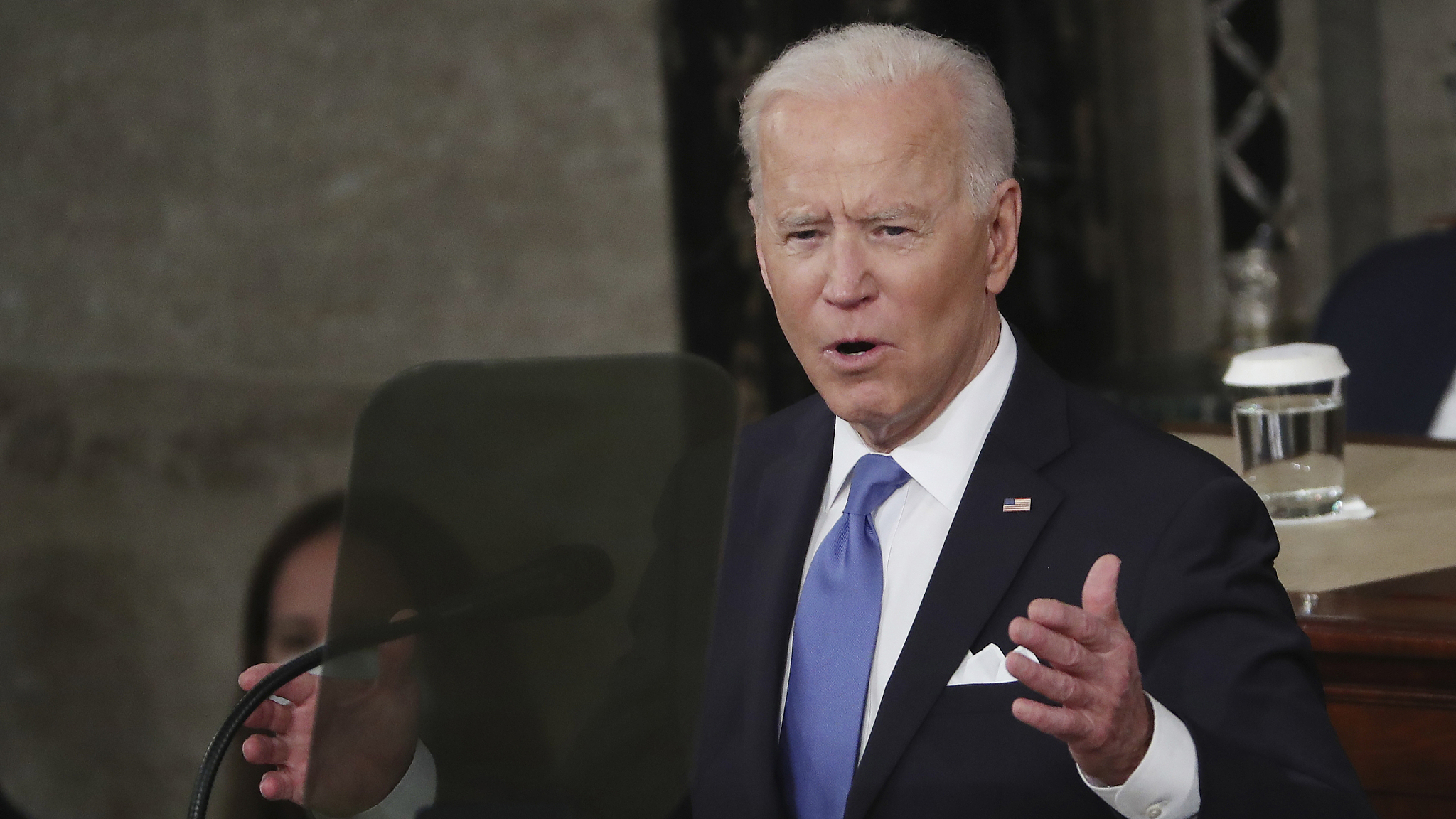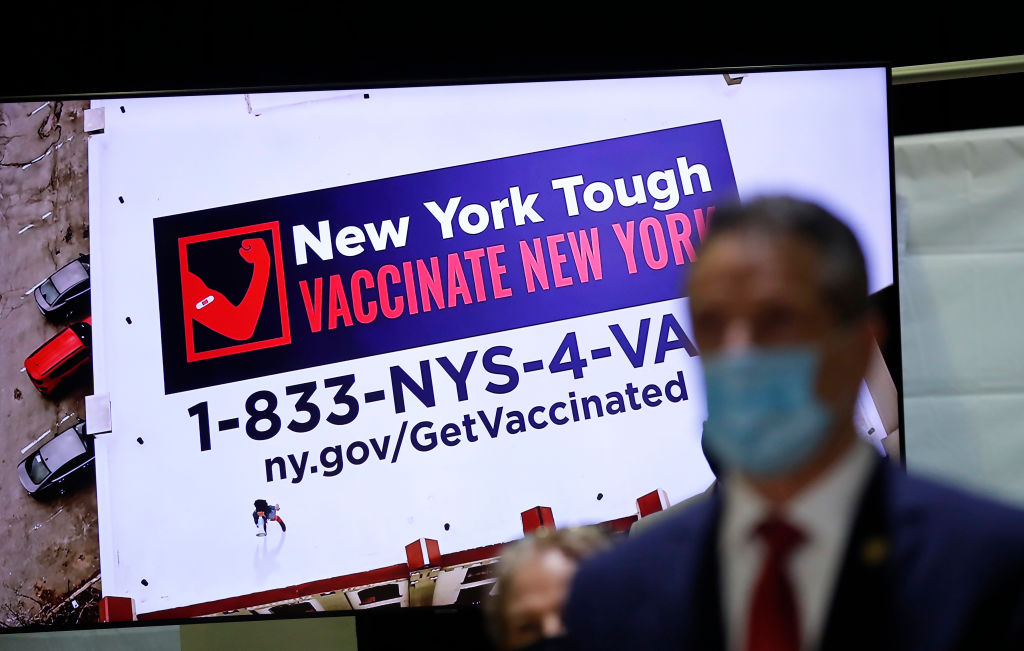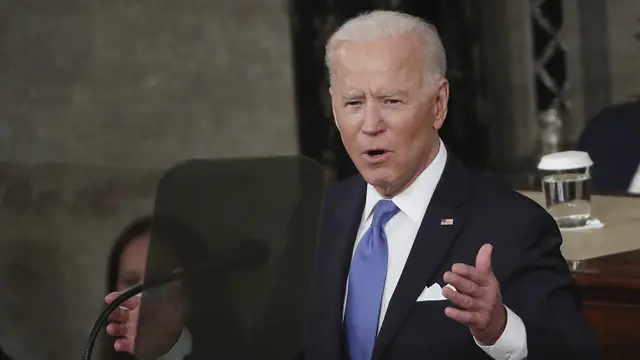
President Joe Biden speaks to a joint session of Congress in the House Chamber at the U.S. Capitol in Washington, D.C., April 28, 2021. /VCG
Editor's note: Bradley Blankenship is a Prague-based American journalist, political analyst and freelance reporter. The article reflects the author's opinions and not necessarily the views of CGTN.
U.S. President Joe Biden gave his first address to a joint session of Congress on April 29, laying out the achievements of his 100 days in office and outlining new legislative goals. Though arbitrary to most casual onlookers, this "honeymoon period" has long been used as an early barometer to gauge the success of an administration, and for Biden, it is indeed consequential considering the situation he inherited.
Fixing the mess left behind by the administration of former President Donald Trump and restoring the office to how it was have been the prominent themes of Biden's presidency.
In his first 100 days in office, Biden lasered in on correcting the federal government's COVID-19 response, picking up a botched vaccine rollout, issuing more executive orders than his three predecessors and revoking a record number of his predecessor's executive orders, a staggering 39 compared to Trump's eight or Barack Obama's nine.
To compare, as noted by FiveThirtyEight, Biden signed only 11 laws in his first 100 days – fewer than all but three presidents since the 1930s. There are no doubt some procedural reasons to explain this, but it does hint to a general fact that politics is so bitterly divided that Congress is becoming less and less able to pass legislation on bipartisan terms.
To add to this, Biden's main legislative achievement so far, the $1.9-trillion COVID-19 relief bill, had been in the works since before he was even officially nominated the Democratic Party's nominee for president. The bill is the second-largest spending bill ever (second to Trump's COVID-19 stimulus bill) and the largest by a president in their first 100 days – but it's clearly owed more to the moment rather than the man.
However, there is of course little doubt in the minds of Americans that Biden has managed the country's COVID-19 outbreak and the resulting economic fallout better than Trump – but that's not saying much since Trump directly ushered in the unnecessary deaths of hundreds of thousands of Americans through his willful negligence.

A public service advertisement is displayed at an event to announce five new walk-in pop-up vaccination sites for New York City Bodega, grocery store and supermarket workers amid the COVID-19 pandemic, in the Harlem section of Manhattan, New York City, U.S., April 23, 2021. /Getty
Even though he managed to help the country turn the corner, Biden, who campaigned on bringing the nation together, has undoubtedly struggled to be seen as a unifier. As of Gallup's latest poll, Biden has a 56 percent overall approval rating – but with an 85 percent partisan gap. Though Americans are pleased with his pandemic performance, still only 11 percent of Republicans gave him a nod.
It speaks to the power of the country's toxic polarization when a president can successfully (at least in terms of how voters see it) manage the most critical issue. However, it's still not enough to win crossover support. As president, the ball's in Biden's court to figure out this dilemma – and he needs to act since this political environment is translating into street violence and domestic terrorism.
On foreign policy, Biden spent the initial days of his presidency shoring up international support among traditional American allies where it was believed Trump destroyed it. He reached across the Atlantic to key European allies while also turning to the Pacific to drum up support for a new alliance against China.
However, Biden has continued what Will Bunch, a columnist for The Philadelphia Inquirer, cleverly described as "America First lite," i.e. the continuation of Trump's policies (Bunch mentioned refugees and vaccine nationalism as key examples) but with a nicer veneer. There is really no better way to describe it. Biden is a direct continuation of Trump's foreign policy.
To his credit, the U.S. rejoining multilateral institutions and hosting a climate summit is indeed a positive sign that might lead to fruitful, multilateral cooperation in the future – however limited it might be. I would have liked to mention the U.S. withdrawal from Afghanistan as a positive thing, but I think it's more likely the case that a "full withdrawal" is an exaggeration.
All in all, Biden is much better and obviously much more competent than his predecessor – but that was never a high bar. There are still many deep-seated systemic issues that need addressing and, if the polarization already evident in his "honeymoon period" is any suggestion, major legislative victories – namely the goals he outlined on Wednesday – may never happen, and that will certainly be the case if Democrats lose in the midterm elections in 2022.
In general, I think Biden should not try to "make the presidency great again" and instead focus on shaping the office and the country's future. As things begin to settle on the epidemic front, we will inevitably see how equipped Biden is for that task.
(If you want to contribute and have specific expertise, please contact us at [email protected].)
 简体中文
简体中文

